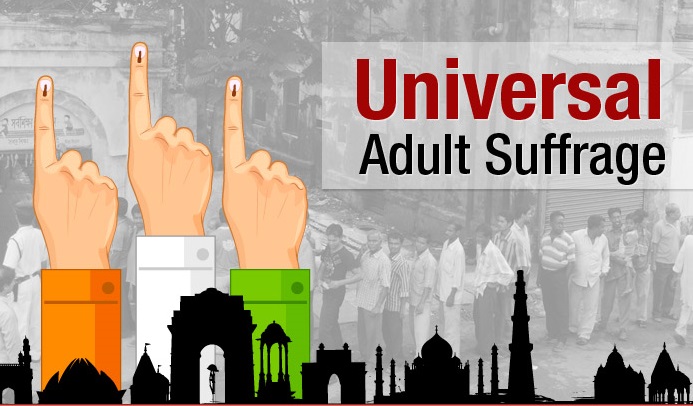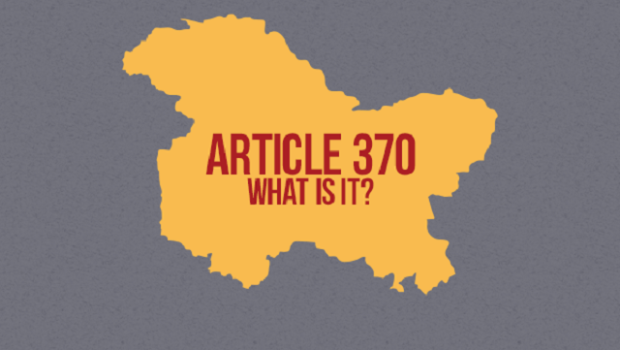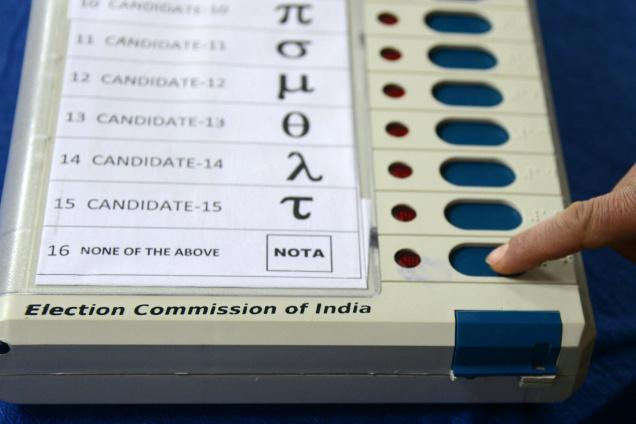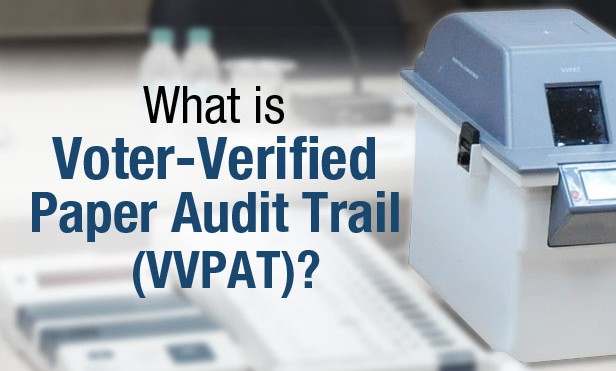There are various facts related to Indian Elections and its procedure that are unknown to many of us. This Article is dedicated to help you by providing as much information as possible on Indian Elections and its systems.
FAQs: Frequently Asked Questions
1. Who holds the highest power in the government?
According to article 53(1) of our Constitution, the highest power is enjoyed by the President of India. Being the first citizen of India, he holds all constitutional powers and uses it directly or indirectly through the officers lower than him in rank. He must take advice from the Prime Minister and Council of Ministers of India and act accordingly.
2. What are the local body elections that happen in India?
Municipality Elections or Nagar Palika Elections:
Nagar Palika is an urban local body which is responsible for governing small districts or relatively bigger cities whose population must not be less than 1,00,000.
In areas where population is in between 11,000 to 25,000, there exists an Elections for Nagar Panchayat which is also known as Notified Area Council.
Elections to Zila Parishad or The District Council:
District Council is an elected body whose members are elected on the basis of adult franchise for a term of five years. It needs to have a minimum of 50 members with a maximum limit being 75.
Village Panchayat Elections:
It is must for a village to have a population of more than 500 to have a gram panchayat and hold elections for its post. Different candidates are selected for a specific post for a period of five year by the villagers itself. The elections of the Gram Panchayat are conducted by state election commissioner in alliance with the District Collector and Tehsildar.
Election to Panchayat Samiti:
Panchayat Samiti is composed of elected members of the area including the heads of the Gram Panchayats within the block area, the elected members of the Lok Sabha, Rajya Sabha and the state legislature who belong to the block.
3. What is Universal Adult Suffrage?

Universal Adult Suffrage in simple terms means “right to vote”. It means every Indian Citizen regardless of their gender, race or, caste who is adult, i.e. over 18 year of age is eligible to vote.
(Source: Wikipedia)
4. What is the difference between General Elections and Assembly Elections?
All elections in India are conducted under the supervision of Election Commission of India. General Elections held for selecting Member of Parliament (MPs). It held every 5 years throughout the nation at the same time but in different phases. After the completion of Elections in all the states, results are declared and the party who gets the majority either of their own or by forming alliance forms the Government at the centre headed by Prime Minister of India.
Assembly Elections alike General Elections also held every 5 years, but only in a particular state/UT. It held for selecting members for Vidhan Sabha called MLAs. The result thus obtained after election, the party who wins majority forms government in the state headed by the Chief Minister of that State/UT.
5. What is article 370?

Article 370 is a very debatable article in our Constitution. This Article is enforced only in “Jammu and Kashmir” state of India. Under this Article, J&K has been granted autonomy. By autonomy we mean to say, it has been given a special status where the citizens follow a different law from rest of the India in terms of Citizenship, Ownership and other rights. Central government is required to ask for permission from State Government for enforcing any law other than Finance, Defence, Communications and Foreign Affairs.
6. How can a Regional party become a National/State party?
A political party shall be eligible to be recognized as a National party if:
- It secures at least six percent(6%) of the valid votes polled in any four or more states, at a general election to the House of the People or, to the State Legislative Assembly,
- In addition, it wins at least four seats in the House of the People from any State or States.
7. What are the main categories of electors in India?
There are basically 3 main categories of electors in India:
- General Electors: Large number of voters falls under this category. These voters are general citizens of India who cast their votes from nearby polling booths.
- Service Electors: Those citizens who work for Indian government falls under this category. These voters cast their vote away from their homes. Armed Forces Personnel, etc. are Service Electors.
- Overseas Electors: Those Indian citizens who don’t stay in India and haven’t accepted citizenship of any other country, i.e. NRI’s, falls under this category.
8. Can a non- citizen of India contest elections in India?
No, a non-citizen of India cannot contest any kind of Elections in India. As per Article 84(a) and 173(a) of our Constitution only those person who have Indian Citizenship are eligible to cast their vote and contest elections for a seat in parliament or in Vidhan Sabha respectively.
9. Who is an overseas (NRI) elector?
The Indian citizens who stays outside India for any purpose and haven’t accepted citizenship of any other country are known as NRI or, Overseas Electors.
10. Can an NRI settled in foreign land become an elector of electoral roll in India?
Yes, as stated above NRIs are Indians who don’t live in India. To register their name in Electoral Roll all they need is a valid Indian Passport showing their name and place of residence in India.
11. Can a non-citizen of India become a voter in the electoral rolls in India?
No, only those citizens are eligible who are Indian by birth or have Indian Citizenship with them. Also NRI’s who accepted citizenship of any other country are not eligible to register their name in Electoral Roll.
12. What is NOTA?

NOTA vote abbreviation of “None of the above” vote which was introduced in India on 27th Sep’13 after the Supreme Court of India ruled in favour of Election Commission of India’s permission of providing a “None of the above” option for voters, as it would give voters the choice of not casting their vote to any of the undeserving candidate.
For complete details on using NOTA Please Read: What is NOTA? How can one cast a NOTA Vote?
13. What is VVPAT?

VVPAT is the abbreviation of Voter Verified Paper Audit Trail System. It is a device, a machine which generates a paper slip which shows to which candidate a voter has voter for. It is like an independent verification system which help votes to confirm that their vote has been recorded to the same candidate they have voted for. This machine was introduced as a pilot trial in only 8 constituencies of India, to detect any kind or error, fraud or, malfunction and to audit the Election Result.
(Source: Wikipedia)
14. Can an imprisoned person eligible for Vote in any Election in India?
Obviously Not. A person who is currently residing in Jail, or has been given a sentence of imprisonment for any crime or penalty is not eligible to vote. However there are some cases when they can. You can find all the details about Can Criminals Vote in India over here.
15. What is the security deposit amount for an Election?
For Lok Sabha Elections, the amount of security money that a candidate need to deposit is Rs. 25,000 while for Assembly or, State Elections this amount is Rs. 10,000. For SC/ST category candidates the amount is Rs. 12,500 and Rs. 5000 respectively.
16. Which candidates lose the deposit?
All those candidates who are unable to get at least one-sixth of total valid votes polled in their respective constituency will not get their security deposit money back.
17. Can a candidate be allowed to spend as much money as he want in Elections?
No, a candidate cannot spend any amount of money as he wants on his election campaign. The maximum amount of money that a candidate can spend on his/her election campaign is limited by the rules set under Conduct of Election Rules. Crossing the maximum limit is termed as corrupt practice and crime and he/she will receive punishment accordingly.
18. Can anyone vote more than once, even if his name is included (wrongly) at more than one place?
No, as per the law every Voter or Adult Indian Citizen can cast only ONE vote for that particular Election even if he/she has their name in two or more places.
19. What punishment does a candidate get if he doesn’t file his account of election expenses?
Any of the candidate who does not file his/her account of expenses in Elections are disqualified from being a member of either House of Parliament or Legislative Assembly or Legislative Council of a State” for a period of three years.
20. What are the procedure for political party registration and its recognition?
Registration of a new political party is a very lengthy process. For this you need to visit Election Commission of India office and fill a 21 page long Registration/Application Form. This application form is the only pre-requirement for those who are interested in forming a new party to contest elections – ECI will then ask the leader to fill the name of the party, its objectives and list all the party members including Office Holders.
New parties must have a minimum of 100 members. The application form along with the registration fee of rupees 10,000 must be submitted to the commission within 30 days of the submission of application.
All those who will be holding office are required to fill up all their details about them, their spouse and children’s, investments and assets, including cash, jewellery owned, and the current value of their properties.
Representatives of the new party formed must then issue advertisement or, notices in local newspapers to announce the objectives of the party. The ECI will then wait for 30-day to know if there is any objections raised by the public. If no objections are raised, the ECI will examine all the affidavits and other relevant documents submitted by the representatives for its genuineness. The party Representatives will get the confirmation from ECI after 4-5 months.
21. What are the power and functions of Election Commission of India?

ECI as we know is Election Commission of India. It is an independent autonomous body that was formed under the constitution to conduct fair elections across the nation.
Its main functions are:
- The Election Commission has the power of superintendence, direction and control of all elections to the Parliament of India and the state legislatures and of elections to the office of the President of India and the Vice-President of India.
- Demarcation of Constituencies
- Election Commission of India prepares the up-to-date list of all the persons who are entitle for voting at the poll for identification.
- It recognize different political parties and allot symbols to them
- Advising the President on the question of disqualification if any Member of Parliament or advising the Governor on the question of disqualification of a member of a State legislature.
Check our post on ECI and the Important Steps Taken by them.
Click here to visit the official website of ECI and know more about it.
22. How a Rajya Sabha Member is Elected?
Rajya Sabha or council of States also known as the Upper house of Indian Parliament. The Rajya Sabha cannot have more than 250 members. Out of these 250 members, 12 members are directly nominated by the President of India. These 12 members are those who carry special knowledge or practical experience in different fields like literature, science, art or social service. The remaining 238 seats are occupied by the representatives of various States and Union territories. The number of seat occupancy are in accordance or proportion to the population of that particular State or UT. These representatives are elected by the elected members of the Legislative Assembly of that State in accordance with the system of proportional representation by means of the single transferable vote.
The terms of houses of Rajya Sabha for its individual member is six years with one third member retires every two years.
23. What was the total strength of Lok Sabha in 1st general election?
The maximum strength of the House that is limited by the Constitution of India is 552. However the strength of the House in first general election was 489.
Also Read: What are the terms of Houses of Parliament in India?

my voter id missing at home please re issue my duplicate voter id ,
if my date of birth is 03/05/2001 then can I apply voter card in sikkim
PLEASE TELL THE STATUS OF OUR VOTES
SRINIVAS ADDEPALL ID NO. AEJ1077908
JANAKIDEVI ADDEPALLI ID NO. AEJ1077940
KINDLY ARRAMGE THE ID CARDS FOR US TO VOTE ASSIMBLY AND PARLMENT ELECTIONS
I am presently registered as a voter in Mahindergarh constituency in Haryana.However I intend to shift to Hamirpur constituency in Himachal Pradesh as henceforth will be living there.
If i get my name deleted in Haryana ,will i be getting a certificate to enable me get registered in the place i intend to shift.
1] My sister living in West Bengal, has applied 2 times for her Voter ID card by application paper form ;
2] but repeatedly her Voter ID card is not done /given. Maybe some TMC emenmy is against it or doing the evil.
3] Now, Dear Sir/Madam, please tell me how she can get her Voter ID card urgently ?
Regards,
Joy Save, Krishna Nagar,Nadia, West Bengal, India.
RESPECT SIR,
my voter ID id messed any where so please issue my new duplicate voter card may name is rakhi my voter card no-XVU1550276
Good, but you have not provided space to Voter ID Card Registration.
i have id card number. but i don’t recived original id card